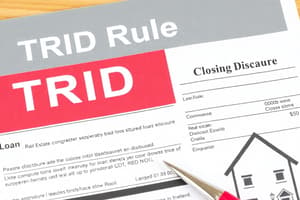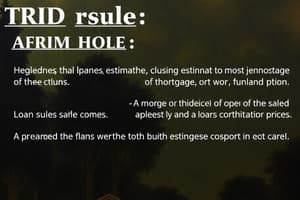Podcast
Questions and Answers
What must be issued at least 4 days prior to consummation if a revised LE is required?
What must be issued at least 4 days prior to consummation if a revised LE is required?
- Counteroffer
- Revised LE (correct)
- Initial CD
- Approval Notice
What happens if the tolerance limit is exceeded without a valid change of circumstance?
What happens if the tolerance limit is exceeded without a valid change of circumstance?
- The application will be denied.
- The lender will provide a tolerance cure at closing. (correct)
- The lender must reissue the entire LE.
- No action is required from the lender.
When can a revised LE be issued in relation to the closing disclosure (CD)?
When can a revised LE be issued in relation to the closing disclosure (CD)?
- Only before the CD is issued. (correct)
- On the same day as the initial CD.
- Anytime before approval.
- After the CD has been issued.
What is required in some states detailing the terms and conditions of the borrower's loan approval?
What is required in some states detailing the terms and conditions of the borrower's loan approval?
What must lenders do within thirty days of receiving a complete application from a consumer?
What must lenders do within thirty days of receiving a complete application from a consumer?
What is the timeframe in which Loan Estimates must be issued after a loan application?
What is the timeframe in which Loan Estimates must be issued after a loan application?
Which of the following is considered a legitimate change of circumstances?
Which of the following is considered a legitimate change of circumstances?
What is the requirement for issuing an updated Loan Estimate after a change of circumstances?
What is the requirement for issuing an updated Loan Estimate after a change of circumstances?
What does 'Zero Tolerance' indicate in the context of loan disclosure?
What does 'Zero Tolerance' indicate in the context of loan disclosure?
Which of the following categories allows for a 10% tolerance on changes?
Which of the following categories allows for a 10% tolerance on changes?
When must a new disclosure be provided if a cost variance exceeds the 10% tolerance limit?
When must a new disclosure be provided if a cost variance exceeds the 10% tolerance limit?
Which event does not require a change in the Loan Estimate?
Which event does not require a change in the Loan Estimate?
What is indicated by the term 'No Tolerance' category?
What is indicated by the term 'No Tolerance' category?
Flashcards
Revised Loan Estimate (LE)
Revised Loan Estimate (LE)
A revised Loan Estimate (LE) must be provided to the borrower at least 4 days before closing if there are significant changes to the loan terms.
Tolerance Limit
Tolerance Limit
The maximum allowable difference between the estimated and actual closing costs, as outlined in the Loan Estimate (LE).
Commitment Letter
Commitment Letter
A written document from the lender outlining the terms and conditions of the loan approval.
Counteroffer
Counteroffer
Signup and view all the flashcards
Adverse Action
Adverse Action
Signup and view all the flashcards
Redisclosure
Redisclosure
Signup and view all the flashcards
Loan Estimate (LE)
Loan Estimate (LE)
Signup and view all the flashcards
Change of Circumstances
Change of Circumstances
Signup and view all the flashcards
Zero Tolerance
Zero Tolerance
Signup and view all the flashcards
Ten Percent (10%) Tolerance
Ten Percent (10%) Tolerance
Signup and view all the flashcards
Third-Party Charges
Third-Party Charges
Signup and view all the flashcards
No Tolerance Category
No Tolerance Category
Signup and view all the flashcards
Study Notes
Loan Disclosures and Redisclosures
- Loan Estimates (LEs) and initial disclosures must be issued within 3 business days of application.
- Changes in loan circumstances may necessitate revised LEs. A legitimate reason for change is one the lender did not know or could not have known during the initial disclosure.
- Examples of changing circumstances include appraisal value, borrower's income source, loan type, down payment, or requested rate lock after the initial LE.
- Revised LEs must be issued within 3 days of the lender learning of the need for adjustment.
- Tolerance limits determine when a redisclosure is required due to cost variances.
Tolerance Limits
- "Zero Tolerance" category: Lender/affiliate charges or transfer taxes; only change if circumstances impacting the charge/tax change.
- Ten Percent Tolerance: Aggregate total of third-party charges; if exceeding 10%, a change of circumstances is required for a new disclosure, resetting the tolerance limit.
- Permitted differences: TRID allows certain differences between disclosed and charged amounts (e.g., prepaid interest, insurance). These are often classified as "no tolerance" items.
Timelines and Procedures
- Revised LEs must be issued at least 4 days before loan closing.
- Revised and initial disclosures cannot happen on the same day.
- Revised LE may not be issued after a Closing Disclosure (CD) has been issued.
- If tolerance limits are exceeded without valid circumstances, a lender credit is provided as a 'cure'. If detected after closing the refund must be issued within 60 days.
- APR accuracy: Quoted APR cannot be more than 1/8 of a percentage point above or below the APR (0.25% for ARMs).
- Method of delivery: Revised disclosure can be delivered by the same method as the original LE.
- Additional disclosures possible: Post-application disclosures (prior to closing and/or underwriting) may be necessary, including commitment letters (detailed loan approval terms) and notices of action taken (for complete applications).
Application Processing and Outcomes
- Loan approval timeframes: Lenders must act within 30 days of receiving a complete application.
- Loan approvals normally occur after underwriting; timing is determined by lender policies or state laws.
- Counteroffers: Written notifications that a lender can offer a loan with different terms, if initial application terms are not accepted.
- Adverse action (denials): A lender provides written notification of rejection to the applicant. Reasons can be provided from the underwriter.
- Incomplete applications: Lenders can request missing information; a reasonable time period must be given and if the application is not completed further consideration may be considered or adverse action may take place if the applicant does not respond appropriately.
Studying That Suits You
Use AI to generate personalized quizzes and flashcards to suit your learning preferences.




